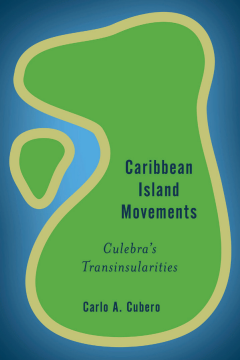
Additional Information
Book Details
Abstract
Caribbean Island Movements explores the different ways in which being mobile is central to the production and reproduction of social identities on the Caribbean island of Culebra. Rather than seeing insularity and mobility, and its associations, as mutually exclusive components, this ethnographic study demonstrates how they mutually inform each other. The book proposes the term of "transinsularism" as a means to articulate the complex ways in which islanders construct a unique place for themselves in the world, while referencing and engaging in practices of movement.
Based on a long term relationship to the Caribbean island of Culebra, it describes how mobile islanders select from various, at times contradictory, discourses and practices in the process of fashioning their sense of island identity. It makes the case for a conscious social creative process where a group of individuals finds ways to narrativise a life-world that operates in tension with structural social forces associated with nation-building, colonialism, and "landed narratives".
Cubero imaginatively tackles models long prevalent in Caribbean Studies that identify the region as insular, victimized, and imperial replicas while also as mobile, victorious, and unique. The island of Culebra is the rich site of this welcome critique, which explores what Caribbean postcolonial, national, and transnational identities can otherwise mean if approached through multiple forms of local agency and practice.
Aisha Khan, Associate Professor of Anthropology at NYU College of Arts and Science
Carlo A. Cubero is an Associate Professor and Chair of the Department Social & Cultural Anthropology at Tallinn University in Estonia.
This ethnographically rich experience-near study of music and life in the tiny island of Culebra is a fine example of how research in the Caribbean can benefit from an intellectual approach that is simultaneously archipelagean, transinsular and cosmopolitan. Carlo Cubero brings ‘mangrove’ methodology to his anthropological understanding of Culebra and hence of contemporary world society.
Huon Wardle, Director of the Centre for Cosmopolitan Studies, University of St Andrews
In particular, scholars interested in island geographies will find Cubero's analysis provocative. Those interested in migration (particularly to places like Lampedusa, Malta or Lesbos) will find transinsularity a useful term to understand the politics of exclusion and inclusion during periods of heightened migratory flows. Finally, the book questions the fundamental categories that have been traditionally mobilized to describe the Caribbean. For this reason alone, I encourage all Caribbeanists and island scholars to grapple with Cubero's provocative ethnography.
Carlo Cubero’s wonderfully sensitive and rich exploration of Caribbean transinsularity breaks new ground by grasping the relationship of immanence that exists between the circulations and stabilities of human social life. We learn ethnographically how people forge lives that are at once insular and transnational, and which unsettle academic and political perspectives that privilege one dimension over the other.
Peter Wade, Professor of Social Anthropology at the University of Manchester
Table of Contents
| Section Title | Page | Action | Price |
|---|---|---|---|
| Cover | Cover 1 | ||
| Half Title | i | ||
| Series Information | ii | ||
| Title Page | iii | ||
| Copyright Page | iv | ||
| Dedication | v | ||
| Table of contents | vii | ||
| Preface | ix | ||
| Chapter One Transinsularism from a Caribbean Perspective | xxi | ||
| General Views of Caribbean Insularities and Mobilities | xxviii | ||
| Plantation | xxxii | ||
| Creole | xxxvi | ||
| Transnationalism | xliii | ||
| The Site | xlvi | ||
| Chapter Two Militarisation and Culebra’s Transinsular Precedents | li | ||
| Colonisation of Passage Island | liv | ||
| The Arrival of The U.S. Navy | lx | ||
| U.s. Navy Claims Culebra | lxvi | ||
| Culebrenses Claim Culebra | lxviii | ||
| The Aftermath | lxxix | ||
| Conclusion | lxxxi | ||
| Chapter Three Conflicted Visions of Land | lxxxv | ||
| Visions of Consumable Landscapes | lxxxix | ||
| Mobile Insularities | xcii | ||
| Litigation Over Coastal Access | xciv | ||
| The Coastal Gentrification Argument | xcvii | ||
| Discrepant Networks in Culebra’s Landscape | c | ||
| Romero’s Rejection of The Noble Savage: Two Instances | cv | ||
| Costa Bonita | cv | ||
| Estudios Técnicos, Inc. | cviii | ||
| Binaries Nonetheless | cxii | ||
| Notes | cxv | ||
| Chapter Four Working the Ubiquitous Seas | cxvii | ||
| Introduction: How is The Sea? | cxvii | ||
| The Atlantic | cxxvi | ||
| The Ship | cxxvii | ||
| The Culebra Fishermen’s Association | cxxix | ||
| The Fishing Reserve | cxxxiv | ||
| Snapperfarm | cxxxvii | ||
| Conclusion: The Ubiquity of The Sea | cxlii | ||
| Notes | cxlvii | ||
| Chapter Five Musical Movements | cxlix | ||
| Music and Place | clii | ||
| The Spanish Caribbean: Salsa, From Transnationalism to Nationhood | cliv | ||
| The English Caribbean: The Steel Band Movement of Trinidad and Tobago | clvii | ||
| Musical Mobile Insularities | clxi | ||
| The Sounds of Culebra I: La Sonora Culebrense | clxiii | ||
| The Sounds of Culebra II: Los Isleños | clxvi | ||
| The Sounds of Culebra III: The Culebra Municipal Steel Band | clxviii | ||
| The Sounds of Culebra IV: La Wiki Sound | clxxi | ||
| Sounds of Culebra: Calypso | clxxiv | ||
| Mobile Insularities or Improvised Structures in Culebra’s Social Relations | clxxv | ||
| Notes | clxxviii | ||
| Conclusion: An Eye on the Creative Tension | clxxix | ||
| References | clxxxix | ||
| Index | cxcv |
